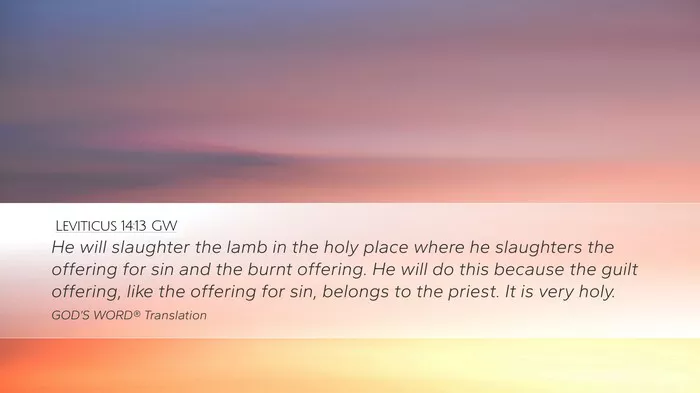Read the Daily Bible Verse – Leviticus 14:13 To Strengthen Your Spiritual Journey.
The Bible contains profound lessons for our spiritual journey. Each verse, when studied in its context, reveals the depth of God’s plans for humanity. Leviticus 14:13 is one such verse, rooted in ancient Israel’s practices and filled with spiritual significance. In this article, we will explore its context, meaning, and application.
The Context of Leviticus 14:13 KJV
Understanding the Book of Leviticus
Leviticus is the third book of the Bible and part of the Torah, written by Moses. It provides detailed instructions for the Israelites on how to live holy lives and maintain fellowship with God. Central to Leviticus is the theme of atonement—restoring the relationship between sinful people and a holy God.
The Purpose of Leviticus 14
Leviticus 14 specifically deals with the laws for cleansing individuals who have been healed of leprosy. In ancient Israel, leprosy was a term used for various skin diseases. It symbolized sin and separation, as those with the disease were considered unclean and excluded from the community.
The Ritual of Cleansing
The process of cleansing a healed leper involved a priest, specific sacrifices, and rituals. These steps emphasized that restoration to the community and to God required divine intervention. Leviticus 14:13 is part of this purification process.
Leviticus 14:13 (KJV)
Here is the verse in the King James Version:
“And he shall slay the lamb in the place where he shall kill the sin offering and the burnt offering, in the holy place: for as the sin offering is the priest’s, so is the trespass offering: it is most holy.”
This verse is part of the instructions God gave to Moses regarding the cleansing ceremony for a person healed of leprosy. It highlights the importance of sacrifice in reconciling a person to God.
Leviticus 14:13 Meaning
The Lamb as a Sacrifice
In Leviticus 14:13, a lamb is sacrificed as a trespass offering, symbolizing the individual’s sin and the need for atonement. The lamb’s death represented the penalty for sin and pointed to the ultimate sacrifice of Jesus Christ, the Lamb of God.
The Holy Place
The verse specifies that the sacrifice must occur in the holy place, the location where offerings were made to God. This demonstrates the sanctity of the act and its connection to God’s presence.
The Role of the Priest
The priest acted as a mediator between the individual and God. By performing the sacrifice, the priest facilitated the person’s purification and restored their fellowship with the community and God.
The Sin and Trespass Offerings
The verse also mentions the sin offering and trespass offering, both integral to the cleansing process. These offerings symbolized the acknowledgment of sin and the need for God’s forgiveness. They reinforced the understanding that only through God’s provision could someone be cleansed and reconciled.
Leviticus 14:13 Application in Life
A Picture of Redemption
The sacrificial lamb in Leviticus 14:13 foreshadows Jesus Christ, who came as the ultimate sacrifice for humanity’s sins. As Christians, we can see this verse as a reminder of the immense cost of our salvation and the depth of God’s love.
The Importance of Cleansing
Just as the leper needed to be cleansed to rejoin the community, we must seek spiritual cleansing to maintain a close relationship with God. This involves confessing our sins and relying on Jesus’ sacrifice.
Gratitude for Jesus’ Sacrifice
The detailed rituals in Leviticus highlight the complexity of the old covenant system. Today, we can approach God directly through Jesus. Reflecting on this verse inspires gratitude for the simplicity and access we have through Christ’s sacrifice.
Living a Holy Life
Leviticus emphasizes holiness and obedience. While we no longer follow the sacrificial system, the principles of living a holy life still apply. We are called to walk in purity, love, and faithfulness to God.
Conclusion
Leviticus 14:13 may seem distant from modern life, but it carries timeless truths about sin, atonement, and restoration. The verse reminds us of the holiness of God, the seriousness of sin, and the provision He made through Jesus Christ. By studying its context, meaning, and application, we see how deeply God cares about reconciling us to Himself.
As we meditate on Leviticus 14:13, may we be inspired to live lives of gratitude, seek spiritual cleansing, and reflect the holiness of our Savior in all we do.
Related topics:
- Leviticus 14:12 Meaning, Context & Commentary
- What Does Leviticus 14:11 Mean?
- Leviticus 14:10 Meaning, Context & Commentary

